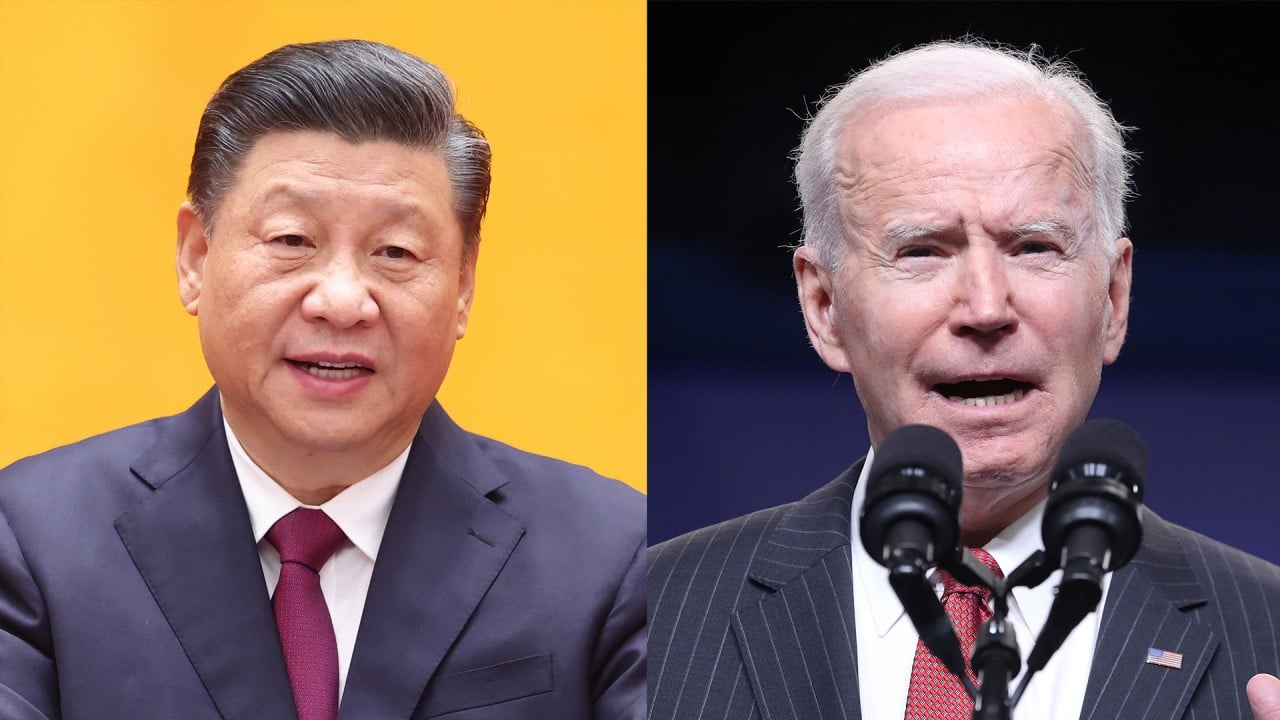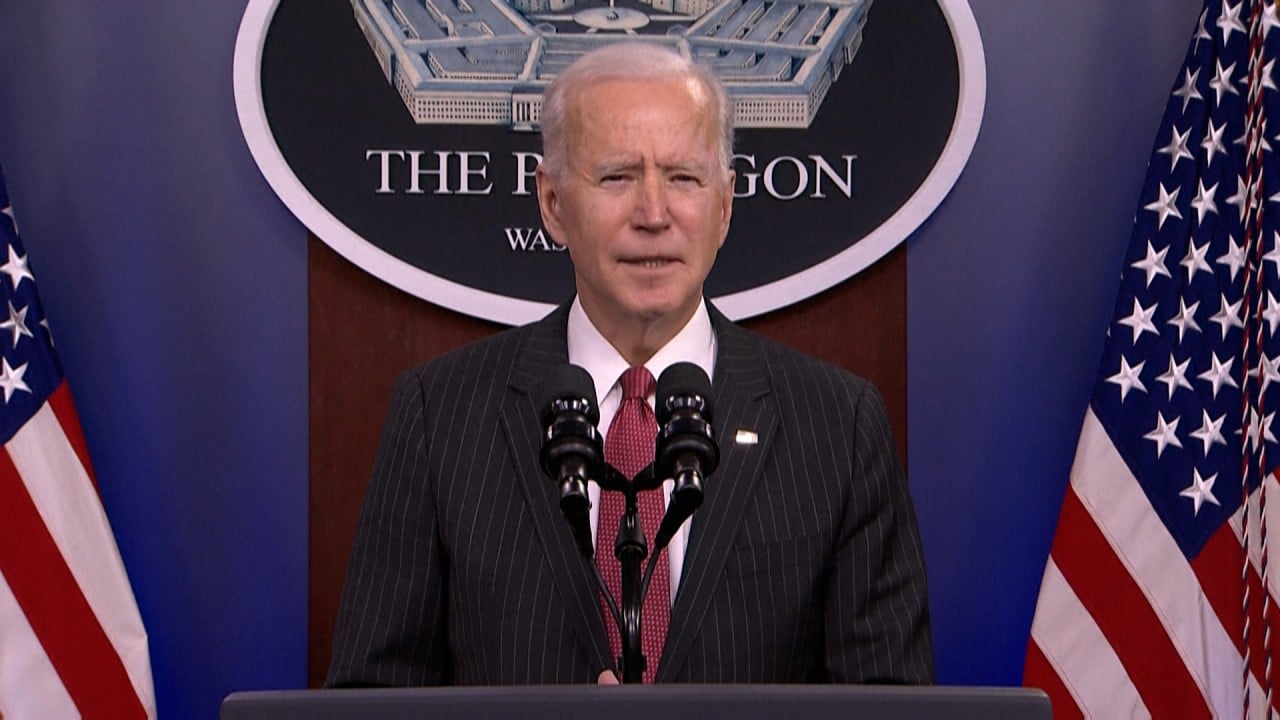
US-China relations: Xi and Biden break the ice with phone call, but can they dial down tensions?
- Analysts say conversation is a first step in getting ties on the right track, but Washington is expected to continue taking a tough line on Beijing
- US messaging emphasised concerns raised on economic practices, human rights and Taiwan, while China focused on cooperation and dialogue
According to Shi Yinhong, a professor of international relations at Renmin University in Beijing, the call showed the leaders were trying to get ties on the right track, but he expected the hardening US stance on China to continue.
Wei Zongyou, a professor at the Centre for American Studies at Fudan University, said the timing of the discussion was symbolic but it would not be easy to resolve the tensions.

00:54
US-China confrontation would be ‘disaster’, Xi says in first phone call with Biden
“Relations do have a chance for a turnaround, but given the many problems the two sides have – on Taiwan, Hong Kong, Xinjiang, trade, technology and other issues – it will be very challenging to ease tensions and cannot be done overnight.”
Biden tweeted on Friday morning that he had spoken to Xi on “concerns about Beijing’s economic practices, human rights abuses and coercion of Taiwan”, and would work with China “when it benefits the American people”.
The White House read-out said the two sides could cooperate on global health security, climate change and preventing weapons proliferation – the last issue notably left off the Chinese statement.
The Chinese leader also referenced a conversation in 2011 with then vice-president Biden in Sichuan province, when Biden was asked for a definition of America and he replied: “possibilities”.
“We hope the possibilities will now point towards an improvement of China-US relations,” Xi told Biden, according to Xinhua.

While Biden spoke to Xi about “preserving a free and open Indo-Pacific” – a framing of the region seen by Beijing as an effort by the US to work with India, Japan and Australia to constrain China – Xi said the two sides should “jointly safeguard peace and stability in the Asia-Pacific region”, a term used by the Barack Obama administration.
On the Chinese side, the messaging on the call focused on how the two should establish dialogue mechanisms to “manage their differences”, and quoted Xi as saying that the US needed to respect China’s “core interests” and sovereignty when it came to Taiwan, Hong Kong and Xinjiang.
Lev Nachman, a visiting scholar at National Taiwan University, said the statements were aimed at the two sides’ domestic audiences, which explained why they were so different.
China envoy says US blocks technology exchange, creates global uncertainty
“It’s very similar to when China does these flyovers within the Taiwan Strait,” he said. “Taiwanese citizens are not particularly bothered, the intended audience is not really Taiwanese citizens as much as it is to display to the domestic [mainland] audience that Xi has not let Taiwan go and that this is still a central issue to the [Communist Party].”
Analysts say that while Beijing has repeatedly called for a reset with the Biden administration, this is unlikely given that the US political consensus has increasingly hardened against China over a host of concerns on trade, technology, human rights, competing strategic influence and ideology.

00:41
US President Joe Biden orders new Pentagon task force to review China strategy
Shi said the Biden team had signalled since its inauguration on January 20 that it would maintain the hard stance on China, particularly in the Taiwan Strait and South China Sea.
“Even though the Chinese side keeps calling out the US, the US is now engaged in a strategic patience approach and is ignoring the softer elements of China’s messaging,” said Shi, also an adviser to the State Council, China’s cabinet.
US-China confrontation would be ‘disaster’, Xi tells Biden in first call
“We do not rule out high-level communication and limited dialogue between the two sides, but the US’ fundamental approach on China will remain tough on core issues, with a comprehensive review of the Trump administration’s policies.”
Ja Ian Chong, an associate professor of international relations at the National University of Singapore, said while the Chinese messaging was softer, it suggested that Beijing did not want to convey any sense of responsibility for the tense relationship.
“[China’s] measured tone in contrast to the US read-out, along with the gestures towards cooperation, may be an attempt to paint the US as the aggressive, unreasonable party that will be to blame for any problems that arise in US-[China] relations or global problems arising out of US-[China] tensions,” Chong said.

Biden’s call with Xi reflects the more confrontational nature of the bilateral relationship in recent years. In comparison, when Trump first called the Chinese leader in January 2017, the White House said Trump had agreed to “Xi’s request” to honour the “one China” policy on Taiwan in an “extremely cordial” conversation.
However, Trump went on to boost relations with Taiwan to new heights, in August sending then-US health secretary Alex Azar to visit the self-governing island, the highest-ranking US official to make such a trip since Washington switched official diplomatic recognition from Taipei to Beijing in 1979.
Because of these unprecedented moves, Biden’s victory in the 2020 election was met with some initial hesitation in Taiwan as many wondered whether he would continue the Trump administration’s stance towards the island, according to Nachman at National Taiwan University.
“From Taiwan’s perspective this is something to be celebrating,” Nachman said. “I don’t think anyone following the Biden transition really expected Biden to go this far, to put Taiwan front and centre in its East Asian foreign policy.”
Additional reporting by Wendy Wu


